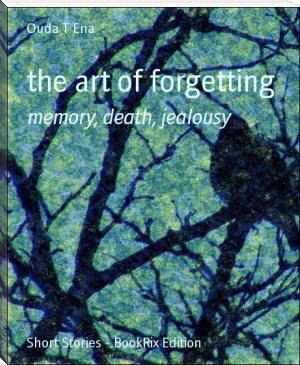The Curse by Ouda T Ena (inspirational novels .txt) 📖

- Author: Ouda T Ena
Book online «The Curse by Ouda T Ena (inspirational novels .txt) 📖». Author Ouda T Ena
[1] The Curse
“Five suicides in one family is a curse. It’s not an ordinary one. It’s not a psychological problem or an inherited disease. It’s a curse.” said the man with the white beard who sat next to me. I didn’t know when and from where he came.
***
The breeze was chilly. The sun was shining but it’s not hot. The clouds hung low on the trees in front of Hemingway’s birth place. Few visitors visited the house this morning. It’s 1.30, two tour guides of the house left when the afternoon shift dozens arrived. I was the morning shift traffic controller. I was waiting for the afternoon person, but he never came. The foundation had hard times finding volunteers these days.
Samuel Adams and Mrs. Miller were the afternoon tour guides. Sam was the oldest volunteer. He was 91 and a half he once said to me. His eyes were weak. He often asked me to dial the phone for a cab. Half of his lungs were gone. Six steps before the front door were often too many for him. I had hard times breathing myself listening to his heavy and short breathing. He often gasped to force the air to get into his lungs.
Mrs. Miller was a middle aged lady. Her gray hair was always done nicely. A big calming smile was always on her face when she talked. Her big blue eyes looked so bright on her white pale face.
“It seems that we don’t have any traffic controller for the afternoon shift?” I asked, reading the schedule for the day.
“I think so.” Mrs. Miller replied. Mr. Adams was sitting in the parlor. I couldn’t see him but I could hear his heavy panting breath.
“I don’t have anything to do. I’ll get something to eat and I’ll be back.”
“Great. The weather is so warm and nice. There might be many people coming this afternoon,” said Mrs. Miller who always dressed up elegantly in classic long dress.
I walked two blocks to get a slice of pizza and a bottle of orange juice. While waiting for the pizza, I looked out of the window. The park across the street was quite. I decided to eat there. Some of the benches were empty.
I sat on a long wooden bench, enjoying my thin crust cheese pizza and watching the kids playing balls and Frisbee. The sweet smell of baked cheese tickled my nose, spread dreamy air around me.
“You are not from around here, aren’t you?” a coarse deep voice of an old man crushed the dreamy cheese bubbles around me. All of the sudden he had sat on the long wooden bench, right next to me. I did not know when and where from he came.
“No. I’m not. I’m a volunteer at the birth place of Hemingway.” I said. The old man was holding a cup of coffee. I could tell it from the smell. He sipped his coffee and his empty eyes gazed across the park.
“Many suicides in that family.” He whispered, looked through the park. Suddenly the park was so quiet and empty.
“Yes. People said that it was a kind of hereditary illness, or maybe depression.” I retorted. I did not know much about it. I knew it from the tour guides at the house and from the internet.
“Five or even six suicides in one family, it must be something. Hereditary illness and depression are nonsense. It must be a curse.” He murmured, talking to himself but it was very clear as if I was putting on my earphones.
“Oh, really?” I turned around and listened to him carefully. He was still in his empty gaze through the bushes in the park.
“First was doctor Ed, he shot himself.”
“People said that he was suffering from hemochromatosis, accumulation of iron in the blood that caused organs failures and depression,” I said.
“At the funeral of their father, Ernest and his brother Leicester swore not to do such a stupid thing like their father. But they both took their lives in the same way.” The old man kept whispering in a flat and low tone of voice ignoring my explanation.
“Next was Ursula, his sister. Then Ernest’s son whose name was Gregory. He changed it into Gloria after changing his sex. ‘She’ died in Miami woman prison, ‘she’ was suspected to commit suicide as well.” I did not want to argue with him about the idea of hemochromatosis, he didn’t seem to care.
“The last one was Margaux, Ernest’s granddaughter, a very successful model. She also took her own life tragically.” He turned to me.
“You know the two owls exhibited in the study cabinet?” he asked. His piercing eyes looked into my eyes.
“I’ve heard the story…” I replied hesitantly.
“They were shot by doctor Ed, Ernest’s father when they were having honeymoon in their summer house by Walloon Lake. Poor owls.” The old man’s face turned long.
“Human is the cruelest thinking beast. We kill for pleasure, make love for pleasure. Beast are often more noble, they kill for food, for procreation. They mate for reproduction, for survival.” I kept quiet. It was a strange way of thinking but it was so true.
“The owls too were having their honeymoon. They perched on a twig under the summer moon. They were in love. The male combed the feathers of his lover. Suddenly, a bullet went through his chest, his bleeding body spiraling down to the ground. The female was frozen, she could have flown away but her claws clutched on the twig. She awaited the bullet of death fetched her. She didn’t want death separated her from her lover.” I listened to him carefully. I felt the agony of love.
“The second bullet flew from doctor Ed’s riffle. The female owl fell on the ground, bleeding. Doctor Ed took them from the ground. On their last breath, they curse the doctor. ‘Tragic death will forever be in your family’, they said.” The old man paused for a long while.
“I guess you know that the greatest power of a soul is because of love and death. The owls were in love and on their last breaths. The curse was the strongest, and it proved to be true.”
I put the last bite of pizza into my mouth and moved two steps to tosh the box into the rubbish bin. When I turned around, the old man was gone.
[2] 6 hours to 2010
I spent the New Year eve watching television. For some people, the changing of years was an important event. The media blew it up, turned it into a huge scale business. For some others, it was only an ordinary day, just like any other days.
It was only 6 p.m. but it was already dark. It was 10 degrees Fahrenheit; soft flurry was falling from the sky, like someone was pouring flour on the trees and streets. I walked to the small bottle shop around the corner to buy cold beer and chips.
The newly fallen flurry was so soft, I felt like walking on a giant kitchen table full of flour. The big trees were all white; some were decorated with strings of blinking lights. The old dark suburb of southern Chicago was not too gloomy after all.
I passed by a nursing home. The windows and doors were decorated with Christmas lights, stars of Bethlehem, garlands, and other decorations. The house was well lighted. I could see old ladies with heavy winter coats gathering around a small television.
The bottle shop was busy. Teenagers who did not have enough money to celebrate New Year in the fancy places in the city gathered around the shop smoking and drinking. I bought a six-pack of beer and three different tastes of potato chips.
On the way back to my apartment, I saw a black sedan pulled over in front of the nursing home. Two men in uniforms got out of the car. I pulled up the collar of my coat to cover my ears for the chilly wind was slapping my face and my ears.
The two officers in long black coats put on their hats. They stood still in front of the door of the nursing home, exchanged glances and knocked the door gently.
I walked slowly, my steps almost came to a halt. Someone opened the door. They talked to her softly. She pointed at an African American woman on the wheelchair a bit further from the television. Without asking, the old woman seemed to know already the news that the two soldiers brought 6 hours from the New Year. Her face turned dim. Her empty eyes gazed blankly through the television.
“Your son had served the country bravely.” I could hear one of the soldiers said confidently, handing her a letter and the name tag of her son.
“Did he die or did he pass away?” asked the old woman in a chant-like tone with her vacant gaze. The two soldiers looked at each other, puzzled.
“Our deepest condolences, Ma’am.” The other soldier replied with hesitation.
“Was he at peace? Was he at rest? Did he bite the dust?” said the old woman, her eyes were glistened with tears. Her voice grew loud almost like a shriek.
The two soldiers were perplexed, muttered an apology and left rather hurriedly.
The old woman tried hard to get out from her wheelchair but failed. She began to sing a blues like song. A heart breaking scream of blues:
“Did he die? Was he at rest? Was he at peace? Did he bite the dust? Did he buy the farm? Did he cash his chips? Or did he just drop dead?
I walked home, turned on my television, drank my beer and watched the 7 o’clock news. It was 5 hours from 2010: seven CIA agents were killed during a suicide bomb attack at Khost and Kandahar near Helmand, Afghanistan. During 2009, 318 American soldiers were killed in Afghan war, doubled in numbers of the previous year.
[3] Negligence Kills
It was the hottest days of the summer. The ambulances were rushing down the streets, rescuing the elderly people hit by the heat waves from the non-air-conditioned nursing home at the corner of the street. Last week, a baby was suffocated to death when his negligence parents left him in the car in the open parking lot. He must be gasping for fresh air like a fish in the boiling water. Or like a convict sentence to death in a gas chamber, the poisonous air shrank his tiny lungs while his body was strapped to his safety seat.
It was too hot, way too hot for everyone except for the gamblers. They were waiting for the buses to take them out to the casinos. Chicago laws mandated that gambling was illegal in the city. The casinos were built in the suburbs, one or two hour of drive from the city. The casinos did not want to put these gamblers into trouble. They provided buses for them in certain spots around the city.
In Chinatown, the pickup point was in front of Cermak-Chinatown redline station. The buses came and went every hour. The gamblers took shade under the train bridge to avoid the burning sun of summer. Mingled with the gamblers were the homeless. They occasionally boarded the buses when they had money. Otherwise, they would only talk to the gamblers who were waiting for their buses, bragged how they lose their jobs, money, and homes.
This hottest afternoon, the bus was late. A woman gambler in





Comments (0)